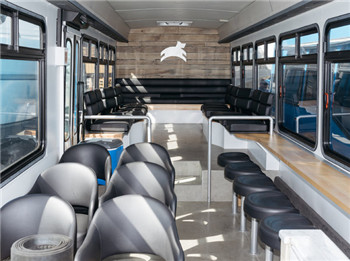(单词翻译:单击)

The first thing you notice when hanging around technology startups is the cultural importance that Silicon Valley ascribes to snacking, with a company's snack bar often standing as a rough proxy for the scope of its ambitions.
光顾科技创业公司时,你注意到的第一件事就是硅谷赋予零食的文化重要性。一家公司的小吃吧通常可以粗略地体现出它的雄心壮志。
Square, Jack Dorsey's payments business, boasts a gleaming coffee bar with a barista who hosts classes on the best ways to brew. On one trip to Facebook, I was treated to an otherworldly bag of popcorn. And just about every company has a refrigerator or two stocked with Hint, a subtly flavored brand of bottled water that seems to flow as freely in San Francisco as the tears of the people who were evicted to make room for the incoming software engineers.
杰克·多尔西(Jack Dorsey)创办的支付业务公司Square拥有一间闪亮的咖啡吧,那里的咖啡师会宣讲调制咖啡的最佳手法。有一次去Facebook,迎接我的是一袋妙不可言的爆米花。而且几乎每家公司都有一两台装满Hint的冰箱。这是一种口感特殊的瓶装水,似乎在旧金山肆意流淌,就像为给将来的软件工程师腾出空间而被赶走的人们的眼泪一样。
Even when a startup's dreams are deferred, the snacks hang on, as I learned during a recent visit to the buses that were once owned by Leap Transit, a startup that once had aspirations of revolutionizing urban transportation.
即使一家创业公司的梦想受挫,零食却会坚持下去,就像我最近去看Leap Transit曾经拥有的大巴车时了解的那样。这家创业公司一度怀揣彻底变革城市交通的梦想。
Leap, which raised $2.5 million from some of the industry's best-known investors, charged riders $6 to get across San Francisco, nearly three times the price of a city bus. Its primary draw was luxury. Each bus had a wood-trimmed interior outfitted with black leather seats, individual USB ports and Wi-Fi. The buses also offered a steady stream of gourmet snacks, sold via app.
Leap从一些赫赫有名的行业投资者那里融资250万美元,向穿越旧金山的乘客收取6美元车费。这几乎是市政公交车三倍的价格。它的主要吸引力是奢华。每辆车内部都有木质内饰,并配备黑色真皮座椅、专享的USB端口和Wi-Fi。这些车还提供大量的精美小食,通过应用程序出售。
I'd come to the see the buses to find out what it looks like when a startup bites the dust. The luxury vehicles were up for auction; Leap filed for bankruptcy in July. The end for Leap apparently came so suddenly that its founders didn't have time to remove much from the vehicles. Inside each bus sitting in an out-of-the-way parking lot near Oakland, California, was a state registration form pinned to the wall, a bundle of iPhone and HDMI cables, and a display case full of snacks. Among the choices were packages of That's It — vegan, gluten-free, non-GMO fruit bars — and organic, paleo Simple Squares.
我来看这些车,是想了解一家创业公司一败涂地会是什么样子。所有的豪华车都被拿出来拍卖;Leap在7月份申请破产。Leap的末日显然来得极为突然,它的创始人甚至没有时间从车上拆掉多少东西。这些车停放在加州奥克兰附近一座偏僻的停车场里,每辆车内部有钉在车上的州级注册表、一束iPhone和HDMI线,以及一个满是小吃的展示柜。其中有几包“That’s It”——素食、无麸质、非转基因的水果棒——和遵循远古饮食法的有机Simple Squares零食。
Leap is one of at least several dozen tech companies that have failed this year. Their deaths are illuminating; dead startups show us which investors' theories are bogus, which technologies aren't ready for prime time, and which common ways founders overextend themselves. They also outline the frontiers of what the current market for tech products and services will bear.
Leap是今年以来至少数十个失败的科技公司之一。他们的死亡颇具启发性;倒闭的创业公司告诉我们,投资者的哪些理论是泡沫的,哪种技术还没有准备就绪,以及创始人通常用哪种方法透支自己。它们也勾勒出了高科技产品和服务目前的市场能承受的边界。
In particular, Leap's death suggests one emerging cause of startup doom, a problem that also did in the anonymous social-network Secret: too-close an association with Silicon Valley's tech-bro sensibilities.
特别是,Leap的倒闭启示了创业公司遭受厄运的一种新兴理由,一个也出现在匿名社交网络Secret身上的问题:与硅谷的高科技兄弟氛围纠缠太深。
Leap, in retrospect, was a bold idea that might have had legs. Muni, San Francisco's public bus system, is overloaded and underfunded, and the success of ride-hailing apps like Uber suggests a public willingness to try new tech-enabled options. But in its design and marketing — in its full-frontal embrace of the easily pilloried paleo-snack-bar techie lifestyle — Leap exuded a kind of bourgeoisie exceptionalism that fed into the city's fears of gentrification and won it few fans. As I stood inside the abandoned buses, it became obvious why the startup failed: Leap was created by and for tech bros. It was born inside the bubble, and it could never escape.
现在回想起来,Leap是一个可能大获成功的大胆想法。旧金山的公交系统Muni的运载能力不足且缺乏资金,而优步(Uber)等叫车软件的成功表明公众愿意尝试新的高科技交通方式。但在设计和营销上,那种对容易被人嘲笑的返朴零食吧技术的生活方式的彻底接纳,让Leap流露出一种资产阶级卓异论,恰好触碰了旧金山担心生活成本上升的神经,没有为其赢得多少支持者。当我站在废弃的车里时,Leap为什么会创业失败就变得很明显:Leap是由高科技兄弟帮创建的,目标群体也是这帮人。它诞生在泡泡里面,永远无法逃脱。
Tech deaths often go unstudied. Silicon Valley stands out for the way it embraces failure, and it's true that the “We Failed!” startup post-mortem note has become a staple on publishing sites like Medium. Still, there's a natural disinclination among entrepreneurs and investors to discuss the deaths of their companies in much depth.
科技企业的死亡往往未得到深究。硅谷以其拥抱失败的方式脱颖而出,而“我们失败了!”这类的创业事后总结也的确成为了Medium等网站中的主要内容。不过,创业者和投资者之间天然存在一种不愿深层次探讨自家企业之死的倾向。
Kyle Kirchhoff, the co-founder and chief executive of Leap, was among several founders of dead companies who did not respond to my requests for interviews. Thanks to such reluctance, no one quite knows how many tech startups are dying, or why.
Leap联合创始人兼首席执行官凯尔·基希霍夫(Kyle Kirchhoff),不是唯一一个没有回应我的采访请求的倒闭公司创始人。正是由于这种不情愿,没有人确切知道有多少科技初创企业正在消亡,或者其中的原因何在。
“There's a lot of fanfare when companies get funded or acquired, but people bury the dead pretty quietly,” said Anand Sanwal, the chief executive of CB Insights, a firm that keeps stats on the startup market. He added that the task is complicated by the fact that many failed startups don't actually die — they limp along for years, underperforming.
“企业在获得融资或收购要约时会大张旗鼓地宣传,但埋葬死者时却很安静,”阿南德·桑瓦尔(Anand Sanwal)说道。他是追踪创业市场数据的CB Insights公司的首席执行官。他还说,很多失败的创业公司并没有真正死去——它们表现不佳却苟延残喘多年——这一事实让任务变得更加复杂。
Sanwal estimated that the number of startup failures increased in 2015, but he believed the uptick was most likely because many more companies were founded and funded a few years ago, as the tech market began heating up.
桑瓦尔估计失败创业公司的数量在2015年有所增加,但他相信这种上扬很可能是因为许多企业是在几年前科技市场开始升温的时候成立并获得融资的。
“There were companies that went in at the top of the funnel, so a lot more of them are meeting that fate,” he said.
“有不少公司是在漏斗的顶部进入的,所以遭遇这种命运的也要多得多,”他说。
By the time of its bankruptcy auction earlier this month, which attracted only a handful of bidders, Leap was all but forgotten. In its bankruptcy filing, Leap reported that it made nearly $21,000 in the two months during which it offered service. That turned out to be less than two of its buses — which officials told me could no longer start — fetched at auction: One sold for $11,100, and another for $12,100. The buyers were anonymous.
到了本月早些时候Leap进行破产拍卖时,只有极少数竞标人参加。它那时基本上已被人们遗忘了。在破产申请文件中,Leap报告说,在它提供服务的两个月期间取得了近2.1万美元的收入。这竟然还不到它两台大巴车的拍卖会成交价格:一台1.11万美元,另一台1.21万美元。买主是匿名的。据说这两台车已经无法启动。
Could Leap have fared better if it had a taken a less outwardly oppositional stance in its conduct and its branding? It seems likely that would have helped. The company had entered the thicket of San Francisco regulatory and civic debate without spending much time to win over fans in the community. Its onboard aesthetics and services lit up every gentrification warning sign, such that, from the start, Leap seemed designed only for those people — the tech people who give everyone else a bad name.
如果Leap在其行为和品牌上采取了较不明显的对立立场,它是否能有更好的表现?这看似会有所帮助。破产前,公司已经卷入了旧金山的监管和公民辩论的纠缠中,却没有花太多的时间来在社区中赢得支持者。其车辆内部的设计和服务触动了所有高档化预警信号。它们从一开始就表明,Leap似乎只是为那些人设计的,那些给所有从业人员都带来了坏名声的科技业人士。
Some companies can escape their image. Uber, a company whose endless run-ins with authorities have covered its brand in an ethical haze, is still experiencing growth because the product remains truly useful to riders and drivers. But the winners are the exceptions. Most companies can't repeat unlikely success.
一些公司可以逃避自己的形象问题。例如优步,它与有关当局无休止的争执与对抗已让其品牌蒙上一层道德阴霾,但却仍在不断发展,因为它的产品对乘客和司机确实有用。但赢家是例外。大多数公司无法重复这种不太可能的成功。
Leap tried. Despite the snacks, it failed.
Leap尝试了。尽管提供了零食,它还是失败了。


